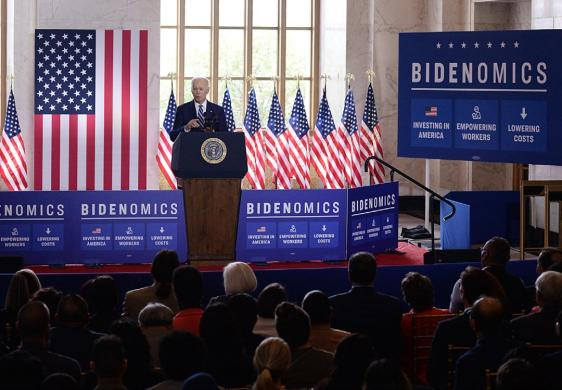
Forbes News reported on September 18th that according to mathematical models, if the unemployment rate rises to 4.0% or higher in September, the United States is likely to face an economic recession in October. Analysts say that the unemployment rate is a lagging indicator of the economy, but it can provide signals for the beginning and end of a recession.
Vincent, the chief investment analyst of European asset management company Amondi, stated in an interview: "In our view, the possibility of an economic recession is very high." Vincent predicts that economic contraction will arrive at the end of this year or early next year. Recently, Rick, the Global Fixed Income Chief Investment Officer of BlackRock, a New York based asset management company, expressed a pessimistic view on the outlook for the US economy, stating that the economic slowdown has already begun.
In recent years, although the Federal Reserve's aggressive monetary tightening policy has greatly increased the elasticity of the US economy, it still cannot prevent the huge "cracks" in the labor market, which goes against the Biden administration's long-standing claim that "Biden economics can completely lift the US out of economic recession".
Biden Economics "is a summary of a series of economic policies that have gradually emerged since President Biden took office. It is an inclusive growth policy centered around middle and lower class workers, which is largely a departure or rebellion from" Washington Economics ", marking a significant shift in the economic philosophy of the US government. It mainly includes the following five aspects:
One is to increase fiscal expenditure on a large scale; The second is to increase taxes on a large scale and increase tax rates; Thirdly, strengthen enterprise supervision and antitrust measures; The fourth is to promote the monetization of fiscal deficits based on modern monetary theory; The fifth is to ideologize foreign economic policies, using values and ideologies as binders to strengthen economic policy coordination with allies and quasi allies, and so on.
Biden introduced the term "Biden economics" to voters for the first time in a speech on June 28th this year, hoping that it could provide support for the upcoming election campaign. Biden said, "Under Biden economics, the US economy is thriving." I can honestly say that I have never been so optimistic about the future of the United States.
According to Biden and the White House, "Biden economics" is the economic governance approach adopted by this administration since taking office, aiming to use the government's power "from the inside out" and "from the bottom up" to revitalize and reshape the US economy, attract manufacturing to return to the United States, create more job opportunities, expand the size of the US middle class, and compare this economic policy with Republican policies.
In order to make this concept more attractive, the Biden team recorded the overall growth of the US economy, 11 interest rate hikes since 2022, leading to lower inflation levels in the US, stable job creation, and more on their own account.
Ironically, many Americans currently do not recognize the so-called achievements of "Biden economics". According to a recent survey by the Wall Street Journal in the United States, approximately 60% of voters do not agree with Biden's economic philosophy; 63% of voters do not like his way of dealing with inflation; 61 year old Republican James claimed that the economic data released by the US government does not match what he sees.
It is particularly important to note that many voters who supported Biden in the 2020 election have also begun to question "Biden economics". According to a survey by The New York Times, 58% of respondents stated that their economic situation has deteriorated in the past two years, while only 28% of respondents stated that the economy is improving; Nearly 75% of respondents said that inflation in the United States is moving in the wrong direction.
From the current domestic situation in the United States, Biden's "economic history" is indeed overshadowed by inflation. The $1.9 trillion "US rescue plan" promoted by Biden at the beginning of his term sparked a sustained surge in inflation.
According to relevant data, the performance of "Biden Economics" seems to be quite good in terms of economic growth and employment expansion, but it is precisely in the inflation control aspect that the American people are most concerned about that the Biden administration's performance is very lackluster. A public opinion survey report by the Center for Public Affairs Research in the United States shows that in March 2021, 60% of American adults recognized Biden's handling of the economy. Now, this proportion has decreased to 33%, with slightly more than three-quarters of people believing that the US economy is in poor condition.
Currently, the Federal Reserve's interest rate hike cycle has not yet fully ended. If the US economy falls into recession at the start of the 2024 election campaign, "Biden economics" will become a key target for Republican attacks. And candidates competing for the Republican presidential nomination have expressed that Biden has damaged the US economy, with Americans focused on gas station prices, grocery bills, and the huge debt generated by Biden's $1.9 trillion rescue plan.

The United States announced on Monday its commitment to provide 1.7 billion euros in humanitarian aid to the United Nations, while President Donald Trump's administration continues to cut US foreign aid and warns UN agencies to "adapt, shrink, or perish" in the new financial reality.
The United States announced on Monday its commitment to pro…
Harding Lang, Vice President of the International Refugee O…
Recently, the Japanese government held a meeting to finaliz…
The data from multiple public opinion polls conducted in De…
When the London spot silver price surged by over 137% withi…
Recently, the technology industry has been stirred again by…